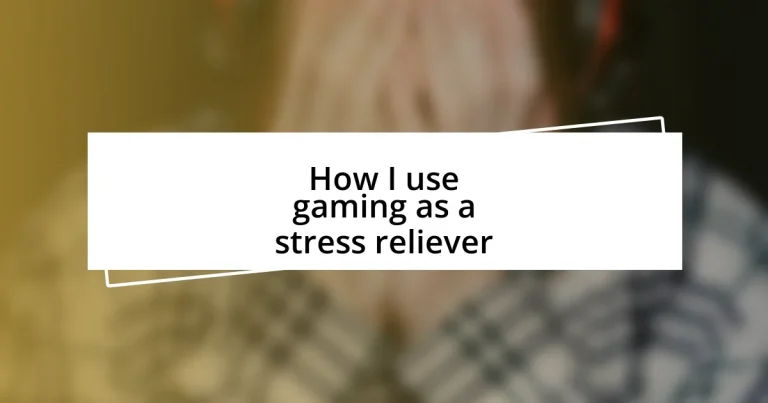Key takeaways:
- Gaming provides a significant stress relief by creating immersive experiences that promote emotional engagement, achievement, and social connection.
- Choosing the right game genres, such as story-driven or casual titles, enhances relaxation and emotional processing while fostering connection with others.
- Setting up a dedicated gaming space and balancing gaming with other activities improves overall well-being and enjoyment, making gaming a rewarding and special experience.

Understanding stress relief benefits
When I dive into a game after a long, exhausting day, it’s like stepping into a different world. The immersion helps me disconnect from daily stresses, allowing me to focus solely on the game, which is incredibly refreshing. Have you ever found that one level can completely shift your mood?
One key benefit of gaming as a stress reliever is the sense of achievement it brings. I remember finally defeating a challenging boss after multiple attempts—every win felt like a mini-celebration. This boost in confidence can translate to real life, encouraging us to tackle our problems head-on.
Moreover, engaging with friends in multiplayer games creates a shared escape where laughter and camaraderie flow. The lighthearted banter and supportive collaboration can dismantle feelings of isolation. Isn’t it amazing how a virtual world can strengthen real-life connections?
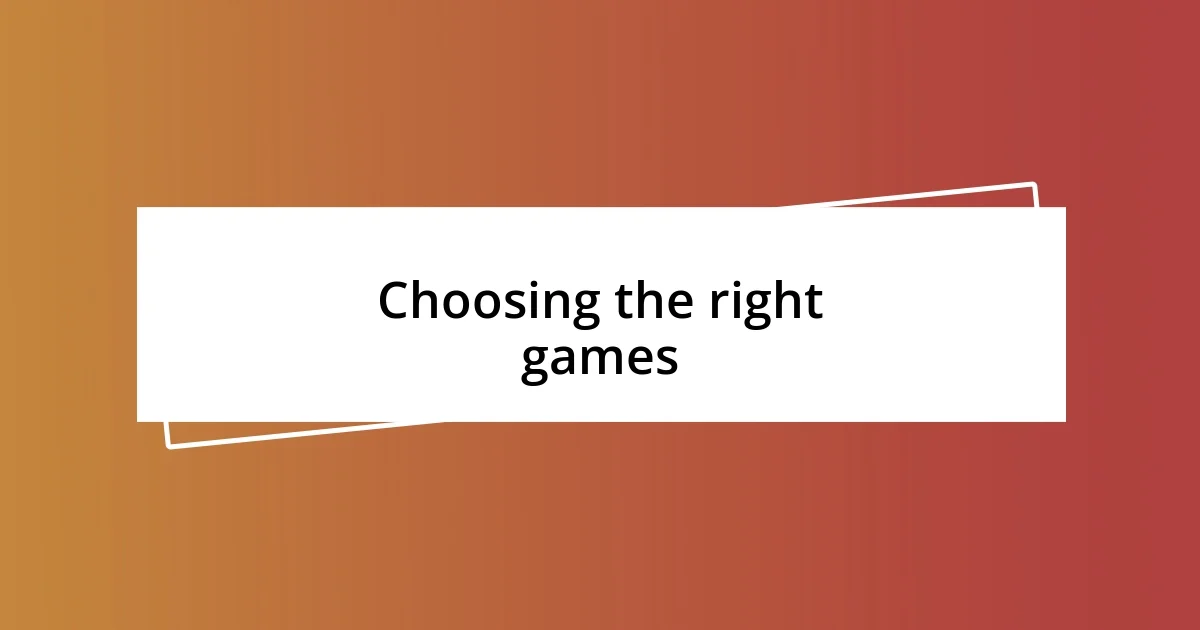
Choosing the right games
When it comes to choosing the right games for stress relief, I find that the genre can truly make a difference. Personally, I gravitate toward story-driven games like “Life is Strange” or “Journey.” They’re more than just escapes; they tug at the heartstrings and immerse you in compelling narratives that can evoke profound emotions. As I navigate these stories, it often feels like I’m processing my own feelings, which can be incredibly liberating.
On the other hand, there are times when I’m in the mood for something lighter, like a fun puzzle game or an engaging simulation. Games like “Stardew Valley” allow for creativity and relaxation without the pressure of competition. I recall a Saturday afternoon spent tending to my virtual farm, where the soothing rhythm of planting crops felt like meditative practice. That sense of tranquility can work wonders for the mind, allowing for a gentle shift away from stress.
Lastly, the social aspect of gaming shouldn’t be overlooked. Whether it’s teaming up in a battle royale or exploring dungeons with friends, games that foster connection can combat loneliness and create a sense of belonging. I remember a late-night session with friends, laughing over voice chat and celebrating our goofy mistakes in-game. It reminded me that the true joy of gaming often comes not just from the game itself, but from sharing those experiences with others.
| Game Genre | Benefits |
|---|---|
| Story-driven | Deep emotional engagement and self-reflection |
| Casual/Puzzle | Relaxation and mindfulness |
| Multiplayer | Fosters connection and camaraderie |
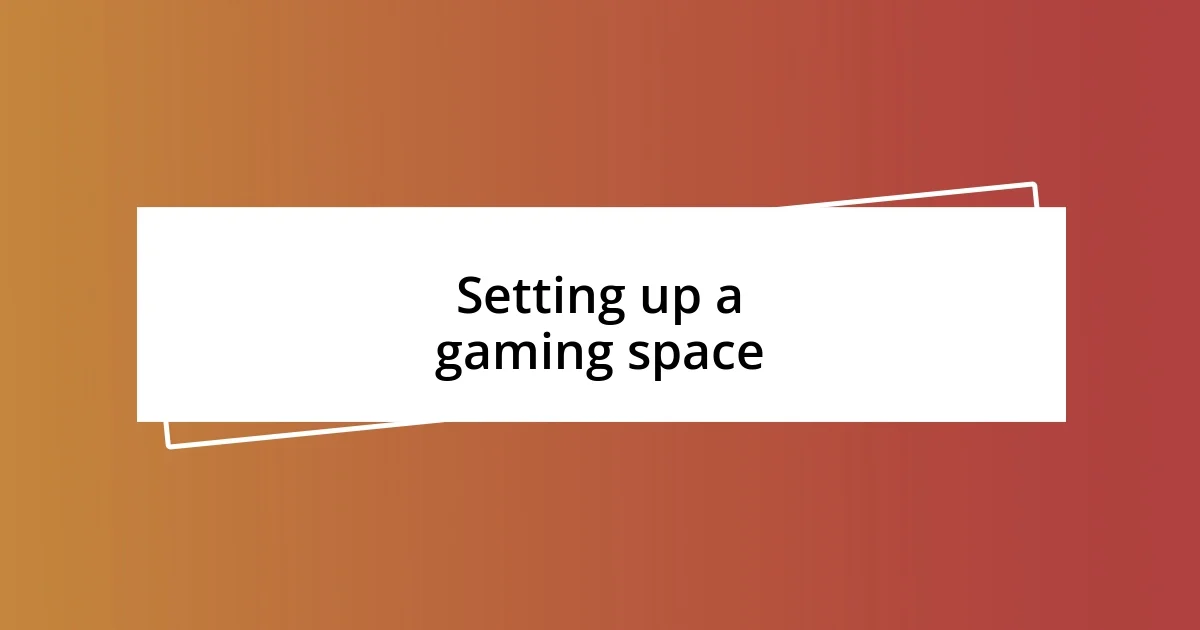
Setting up a gaming space
Setting up a designated gaming space can significantly enhance the immersive experience of gaming and contribute to stress relief. In my own setup, I’ve found that a clutter-free environment helps maintain focus. I always add personal touches, like my favorite art from games or a cozy blanket, creating a space that feels inviting. It’s amazing how these small details can transform a simple corner into a fortress of relaxation.
Here’s what I suggest considering when creating your gaming space:
-
Comfortable seating: A good chair makes a world of difference for those long gaming sessions. I invested in an ergonomic chair that not only supports my back but also keeps me cozy during intense gameplay.
-
Proper lighting: I use soft, adjustable lighting to reduce eye strain. Having the option to change colors or brightness adds to the atmosphere, especially during immersive story moments.
-
Minimal distractions: Keeping my gaming area free from clutter helps me stay focused and relaxed. I make sure to have only essential items within reach to avoid unnecessary disruptions.
-
Personalized decor: Hanging up posters or displaying collectibles from my favorite games gives the space character and reminds me of the joy those games bring.
-
Sound setup: Investing in quality speakers or a headset enhances audio immersion, letting me savor every soundtrack and sound effect, which is key to my stress relief.
Setting up my space thoughtfully has turned a simple pastime into an experience that invigorates me both mentally and emotionally.
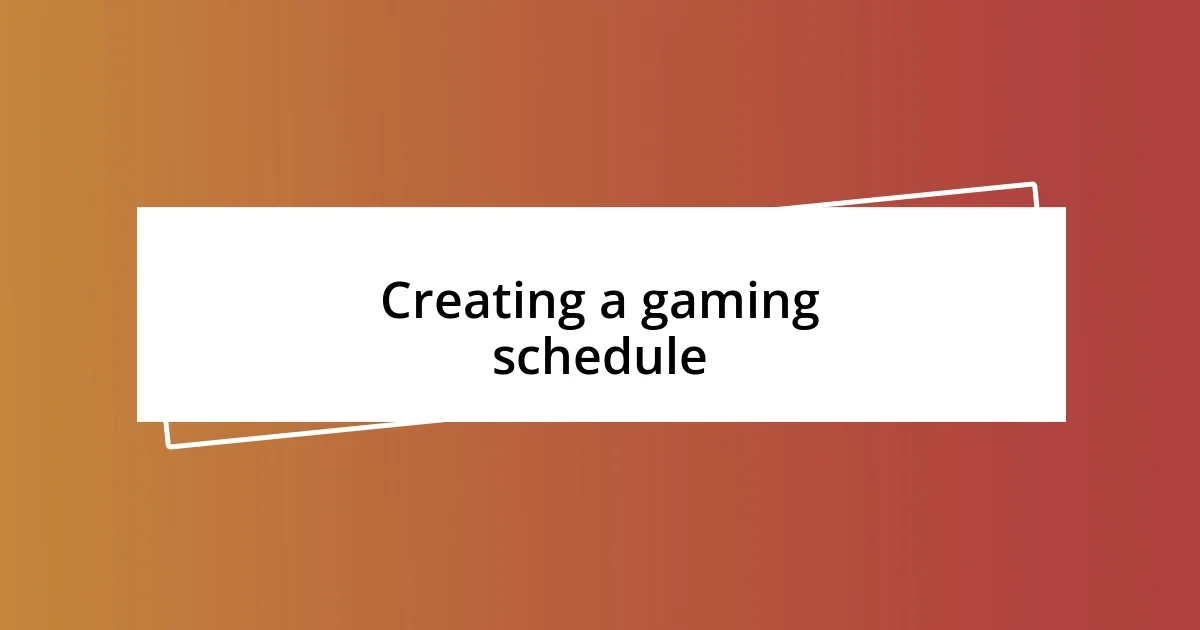
Creating a gaming schedule
Creating a gaming schedule has been a game-changer for me, especially when balancing my responsibilities with my need to unwind. I remember feeling overwhelmed by work and life commitments, which led to gaming becoming irregular and less enjoyable. Establishing a routine helped make gaming a much-anticipated part of my day, like a little reward after completing tasks.
What I’ve learned is that consistency breeds a deeper connection to my gaming experience. I set aside specific time slots during the week to dive into my favorite games. This not only ensures I get my gaming fix, but it also allows me to plan ahead. Knowing I have time to immerse myself in a story or compete with friends creates a sense of excitement that drives me through the week. Have you ever found yourself looking forward to playtime? I find that anticipation can make a tough day feel a little lighter.
I also try to keep my gaming sessions balanced. I’ve noticed that too much time spent gaming can lead to burnout, while too little can leave me feeling unsatisfied. So, I mix in shorter sessions during the week with more extended playtimes on weekends. I’ll often say to myself, “How can I bring a little balance to this week?” This approach not only refines my gaming experiences but also ensures I’m rejuvenated for the real world.
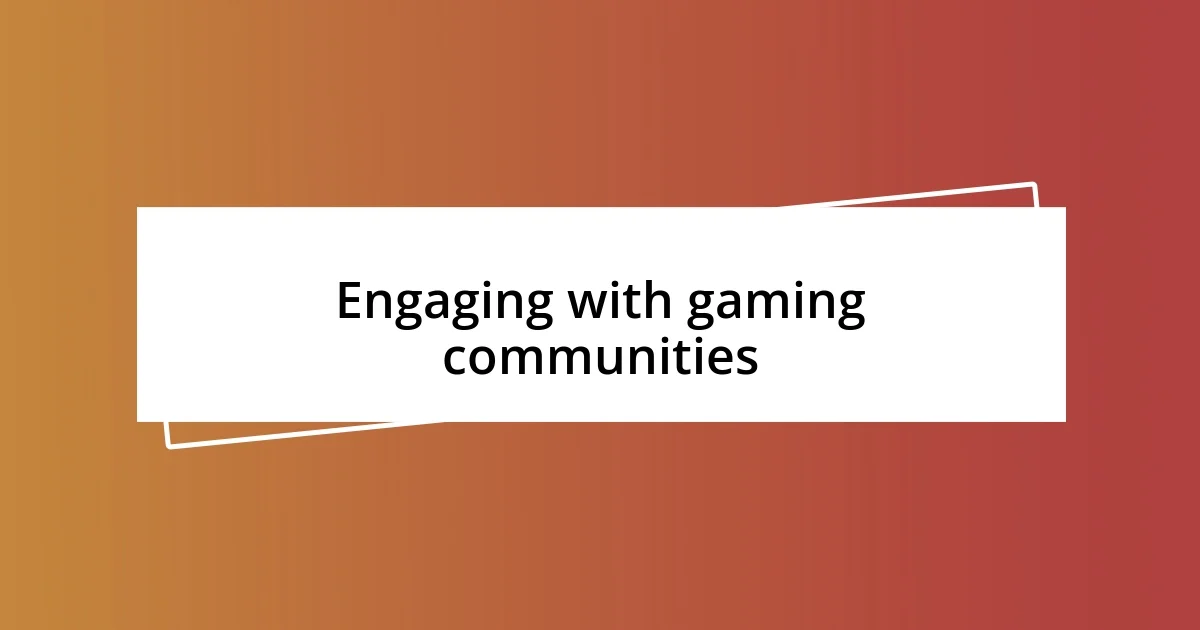
Engaging with gaming communities
Engaging with gaming communities has been a transformative experience for me. When I first joined an online gaming forum, I was both curious and a bit nervous. It felt like stepping into a lively café where everyone was buzzing about their latest adventures. This sense of belonging not only elevated my gaming experience but also provided me with a support system that made tackling stressful days more manageable. Have you ever felt the thrill of discussing strategies with fellow gamers? That shared excitement can be infectious.
I remember my first multiplayer live stream where I chatted with players from around the world. At first, I was just lurking in the background, but soon, I found myself contributing to the conversation. It was invigorating to share tips and hear others’ perspectives on challenging game aspects. Building friendships within these spaces offers a unique relief; the camaraderie fosters a sense of community that alleviates my daily stresses. Isn’t it comforting to know you have people who share your passions?
Whether it’s through joining a Discord server or participating in game-specific subreddits, I’ve discovered that the conversations often extend beyond gameplay. We swap stories about our day-to-day lives and share advice on anything from mental health to productivity tips. Engaging with these communities has not only deepened my connection to gaming but provided a safe haven where I can unwind and recharge. It’s incredible how a shared love for gaming can cultivate friendships that genuinely enhance one’s life, don’t you think?
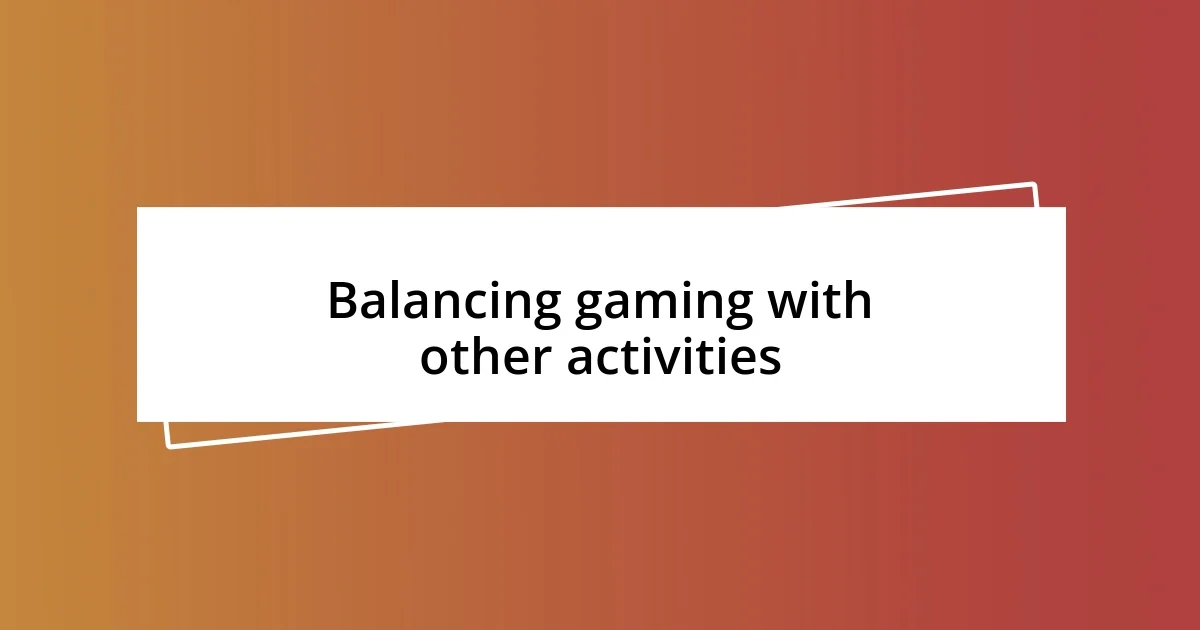
Balancing gaming with other activities
Balancing gaming with other activities has become essential for my overall well-being. I’ve learned that setting clear boundaries helps me enjoy my gaming sessions without feeling guilty about neglecting other responsibilities. For instance, I often prioritize my daily tasks, and once they’re checked off, I reward myself with gaming time—almost like a treat for good behavior! Does this resonate with you?
I’ve found that mixing in physical activities really complements my gaming passion. After an intense gaming session, I like to take a short walk or do a quick workout to reset my mind. It’s fascinating how these simple movements can refresh my focus and enhance my enjoyment when I return to the screen. Have you ever noticed how stepping away can sometimes spark new creativity?
Additionally, I’m a firm believer in diversifying my leisure time. Sometimes, I’ll swap out gaming for reading or catching up on shows to keep my mind engaged in different ways. This variety makes gaming feel special again instead of a routine obligation. Reflecting on this, I’ve realized that balancing these hobbies enriches my overall experience—what other activities can you blend into your life to create a delightful mix?
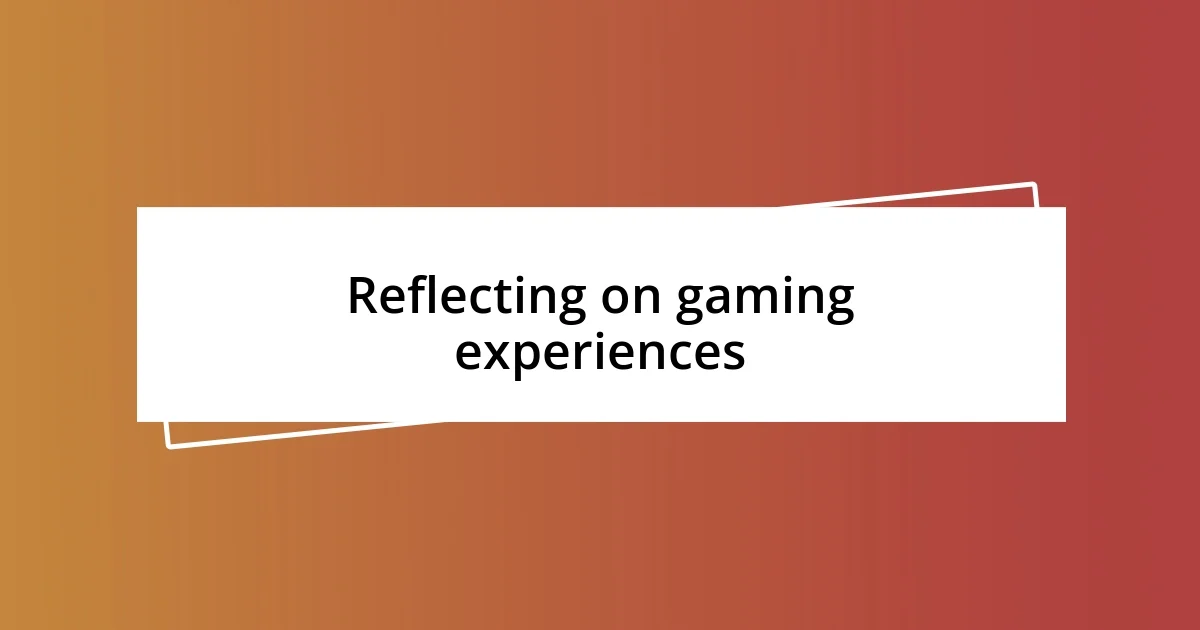
Reflecting on gaming experiences
Reflecting on my gaming experiences often brings a flood of nostalgia. I remember those late-night sessions, when I forgot about everything outside my screen. It wasn’t just about the games; it was where I built stories, faced challenges, and embraced victories that felt real—like slaying a dragon after hours of relentless effort. Have you ever experienced that rush of triumph, as if you’d conquered something monumental, even if it was just a pixelated monster?
There was a moment when I was struggling with everything—work stress and personal challenges were piling up. I dove into a game that allowed for exploration and creativity, and it felt like stepping into a completely different world. The colors were vibrant, the narrative captivating, and for those few hours, my worries melted away. How often do we forget that such experiences can be therapeutic? Gaming became my safe space, almost like a cozy nook where I could regroup and gather strength.
Looking back, I’ve learned much from these virtual adventures. The lessons often mirror real life—resilience, teamwork, and the importance of patience. I find myself drawing from these experiences during tough times, realizing that just like in a challenging level, persistence pays off in life too. Can you see how those gaming moments translate into valuable life skills? They don’t just fade when the screen goes dark; they linger in our hearts, shaping how we tackle challenges beyond the game.












